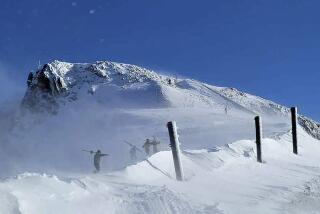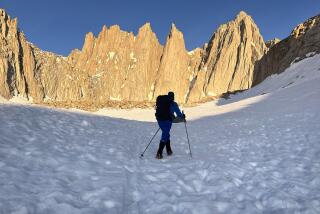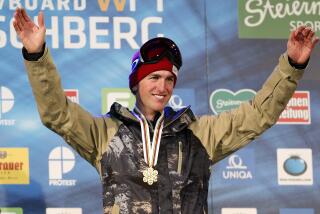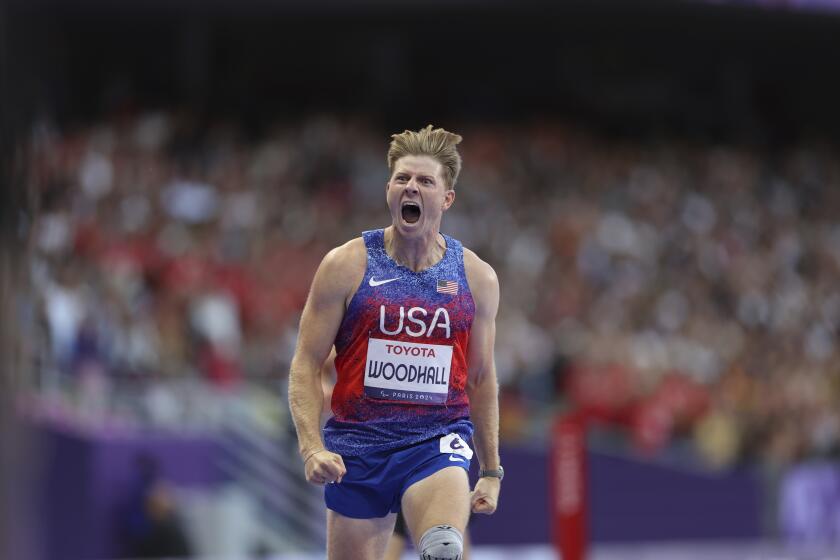Kitt Gets the Vote and the Victory, for Now : Skiing: American wins, but only after the jury agrees, 4-0, to make shortened race official. Result may be overturned.
ASPEN, Colo. — AJ Kitt stood shellshocked, begging someone to tell him this was not happening again.
Not to him, not here, not with the same Austrian judge--Sepp Messner--on the jury that would decide his fate.
It was almost comical.
Almost on cue, in fact, ski bum Chevy Chase, a king of farce, worked his way into the press area as the tension mounted.
Two years ago, Kitt was stripped of victory at the Aspen Roch Cup downhill when officials canceled the race because of a rut in the course.
Sunday, Kitt found himself hip-deep in a similar controversy.
Charging from the 20th start position, Kitt had nailed his run in a time of 1:45.46.
Then, the downhill, already postponed one day because of bad weather, began to disappear in a heavy snowstorm.
Officials first ordered a 12-minute course hold after the 24th racer because of decreasing visibility, then held up the race again after racer No. 31.
As the pit in Kitt’s stomach knotted, the race was ultimately “stopped” but not canceled. The four-man race jury convened to decide whether Kitt’s result would stand or fall.
“This was my hardest day in ski racing,” Kitt would say later.
After an hour of deliberation, in high-noon drama, the jury emerged and pronounced, in a 4-0 decision, that the results were official. Kitt was declared the winner, followed by Austria’s Armin Assinger, who finished second at 1:46.04. Norway’s Lasse Kjus was third at 1:46:15.
But don’t hold your breath.
The decision will be reviewed by the International Ski Federation (FIS), the sport’s governing body, and might be overturned.
“It’s very, very unlikely the (FIS) council will move against the jury here,” U.S. Alpine Director Paul Major confidently said. “The jury was empowered, and they made the correct decision.”
Tom Anderson, chief of race and one of four race jury panelists, was not as optimistic.
“We won the battle, I’m not so sure we won the war,” Anderson said. “The FIS will make that decision. They’ll tell us if it’s right or wrong. It’s kind of like the Supreme Court.”
No one was sure when FIS would rule on the matter. Aspen wasn’t waiting around. Kitt, Assinger and Kjus were quickly crowned in ceremonies and divided up the $60,000 in prize money.
Will they have to give it back?
The French ski team quickly filed a protest. With Assinger’s second-place finish, the Austrian earned 80 World Cup points and vaulted into first place in the downhill standings.
He passed France’s Luc Alphand, who finished 14th.
Just once, Kitt wanted to savor the moment and shun the politics.
“We may have to go through another day like today,” Kitt said. “but I feel like I won the fight.”
He said the “victory” exorcised the disappointment of Aspen in 1993.
“That day has loomed large for me the last two years,” Kitt said. “It was really hard for me to deal with it back then. I tried to shut it out of my mind instead of letting it affect me. It’s always been there in the back of my mind.”
Later, he said, “It feels like I can finally let that one go.”
Kitt, 27, can’t help but feel snake-bit.
Sunday marked his second career World Cup downhill victory, but he easily could have won two more. In 1992, he was leading a downhill at Val D’Isere that was canceled because of poor weather. Then, at Aspen a year later, he was robbed of victory in a jury decision that smacked of FIS politics.
Whatever the FIS’ decision on Sunday’s result, Kitt proved he is back after a two-year slumber. On the Aspen Mountain course, he took the risks of a champion. On a section of the course called Strawpile, Kitt lost his balance and had to touch his wrist to the snow to save himself from crashing.
“The closer to the edge of disaster you are in the speed events the faster you’re probably going to be,” Kitt explained. “There are no perfect downhill runs.”
And no perfect downhill courses. Anderson said the decision to sanction the race had to do with fairness. The jury determined the 31 racers who left the start gate competed essentially under the same conditions.
More important, it was determined the 37 racers who were denied a start did not not have a legitimate chance of winning because the new snowfall had significantly slowed the course.
To wit: Norway’s Harald Christian Strand Nilsen, the last skier, finished with a time of 1:50.30, nearly five seconds slower than Kitt’s winning time.
The point will be argued. Last week, Kitt finished second at the super-G at Whistler, Canada, after starting 54th.
Yet, it seemed unlikely anyone would have caught Kitt at Aspen.
Of the seven skiers who raced off after the first course hold, four finished. Switzerland’s Daniel Mahrer, from the 26th spot, voluntarily skied off course when he couldn’t see.
“If I want to kill myself, I’ll jump off a bridge,” Mahrer said.
Norway’s Asgeir Linberg, skier No. 30, crashed into a retaining fence and broke his left arm.
More to Read
Go beyond the scoreboard
Get the latest on L.A.'s teams in the daily Sports Report newsletter.
You may occasionally receive promotional content from the Los Angeles Times.








